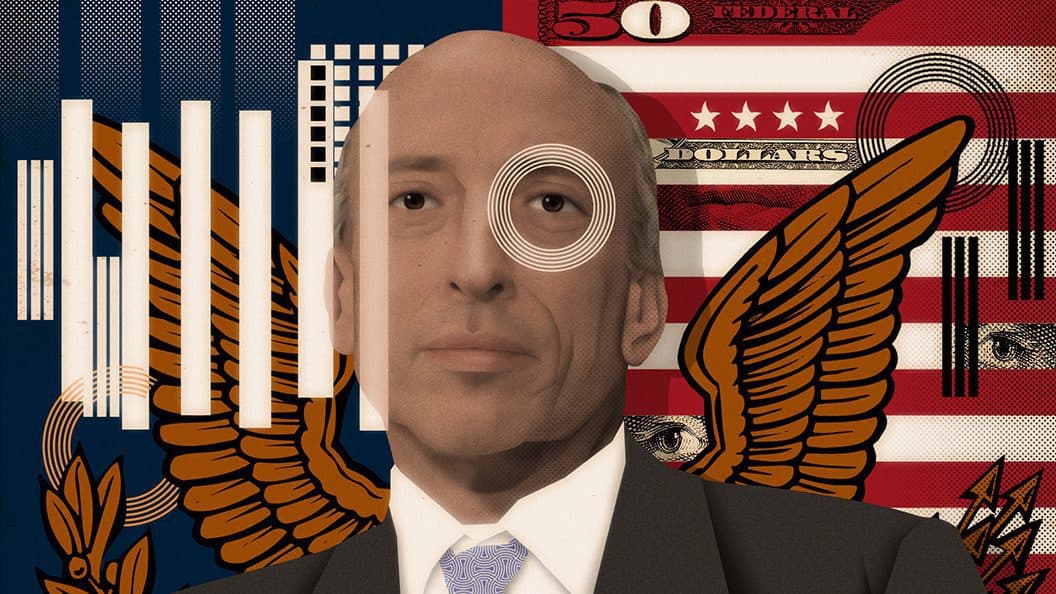SEC Won’t Confirm Nor Deny it Served Anyone at Mainnet 2021
A FOIA request by Blockworks into whether the Securities and Exchange Commission served anyone at Mainnet got a GLOMAR response.

Gary Gensler, Chairman, SEC; Blockworks exclusive art by Axel Rangel
- The SEC will neither confirm nor deny it served anyone at the Mainnet conference in New York
- Terra co-founder Do Kwon, and Ethereum co-founder and creator of Polkadot Gavin Wood both deny being served during the conference
Did the Securities and Exchange Commission serve someone at the recent Mainnet Conference in New York? Maybe, maybe not.
That’s the response the Commission sent back to a Freedom of Information Act (FOIA) request filed by Blockworks in an attempt to answer the question. Ever since Indiegogo founder Slava Rubin tweeted during the conference that he saw someone being served before they went on stage for a speech crypto twitter has been abuzz with speculation as to whom it might be.
For the record, two prime suspects, Terra co-founder Do Kwon, and Ethereum co-founder and creator of Polkadot Gavin Wood, have denied being served by the SEC in statements to The Defiant. While Rubin has remained adamant that he saw someone being served, it’s unclear if the person was being served by the SEC or if it was for an unrelated lawsuit or a personal manner.
Neither yes nor no but GLOMAR
If the phrase “we can neither confirm nor deny” sounds like it comes from the world of espionage and spycraft, that’s because it was first coined by the CIA in response to one of the first journalistic use cases of the then-new Freedom of Information Act.
At the height of the Cold War in 1975 the CIA had contracted deepwater drilling experts Global Marine to retrofit The Hughes Glomar Explorer to hunt for a sunken Soviet nuclear submarine. All of this had to be done without tipping off Moscow, so Langley devised a cover story involving billionaire Howard Hughes ocean mining for manganese nodules.
Journalists at the Los Angeles Times didn’t buy the story and started sleuthing. In response to their Freedom of Information requests the CIA responded with a “we can neither confirm nor deny” which was held up in court upon challenge by the Times. Since then, GLOMAR has become a standard boilerplate response for government agencies whenever they deem that the request might contain, or lead to the discovery of, classified information.
But does the SEC Glomar?
The SEC has considerable interest in neither confirming nor denying journalists’ inquiries into its investigations. After all, even the presence of an investigation — that might end up empty handed anyway — could have a material impact on a listed companies’ share price.
Under the Freedom of Information Act, agencies have nine exemptions they can use to decline requests for information. One of them, Exemption 7, is used when disclosed information “could reasonably be expected to interfere with enforcement proceedings.”
An example of this being used in practice can be found with FOIA queries from 2018 to the CFTC regarding the existence of subpoenas related to crypto exchange Bitfinex and its subsidiary Tether. In response, the CFTC said it had found “thousands of responsive records, all of which are exempt from the FOIA’s disclosure requirement.”
Of course, it doesn’t take someone at the top of the bell curve to deduce that this notice of exemption of disclosure is a notice of an investigation and, for a company, this would possibly be detrimental.
Legal researchers at Duke Law School put this to the test last year to determine what the SEC really means when it responds with a ‘GLOMAR’. The researchers found that there’s a good chance the SEC has no responsive records and doesn’t want to tip its hand. However, there is a substantial element of conditional probability attached to it so nothing is for sure.
As Blockworks has previously reported, the SEC is perfectly within its legal remit to serve foreign nationals and foreign companies.
“Courts are generally favorable to jurisdictional expansion brought by regulators when the actions deal with US customers or interests. But this is hotly debated, as discussed in SEC v. Scoville, in which the 10th Circuit concluded Dodd-Frank abrogated the Morrison Rule, which was the previous standard for extraterritorial jurisdiction,” Kansas City-based securities lawyer and former CFTC enforcement attorney Braden Perry told Blockworks in an email. “The SEC is coming hard against crypto, and the new regime under Gary Gensler is showing it will be aggressive in its enforcement.”
But the question remains, if someone was served at Mainnet was it because of DeFi related enforcement action?
Has anyone checked if Kwon or Wood are getting divorced?






